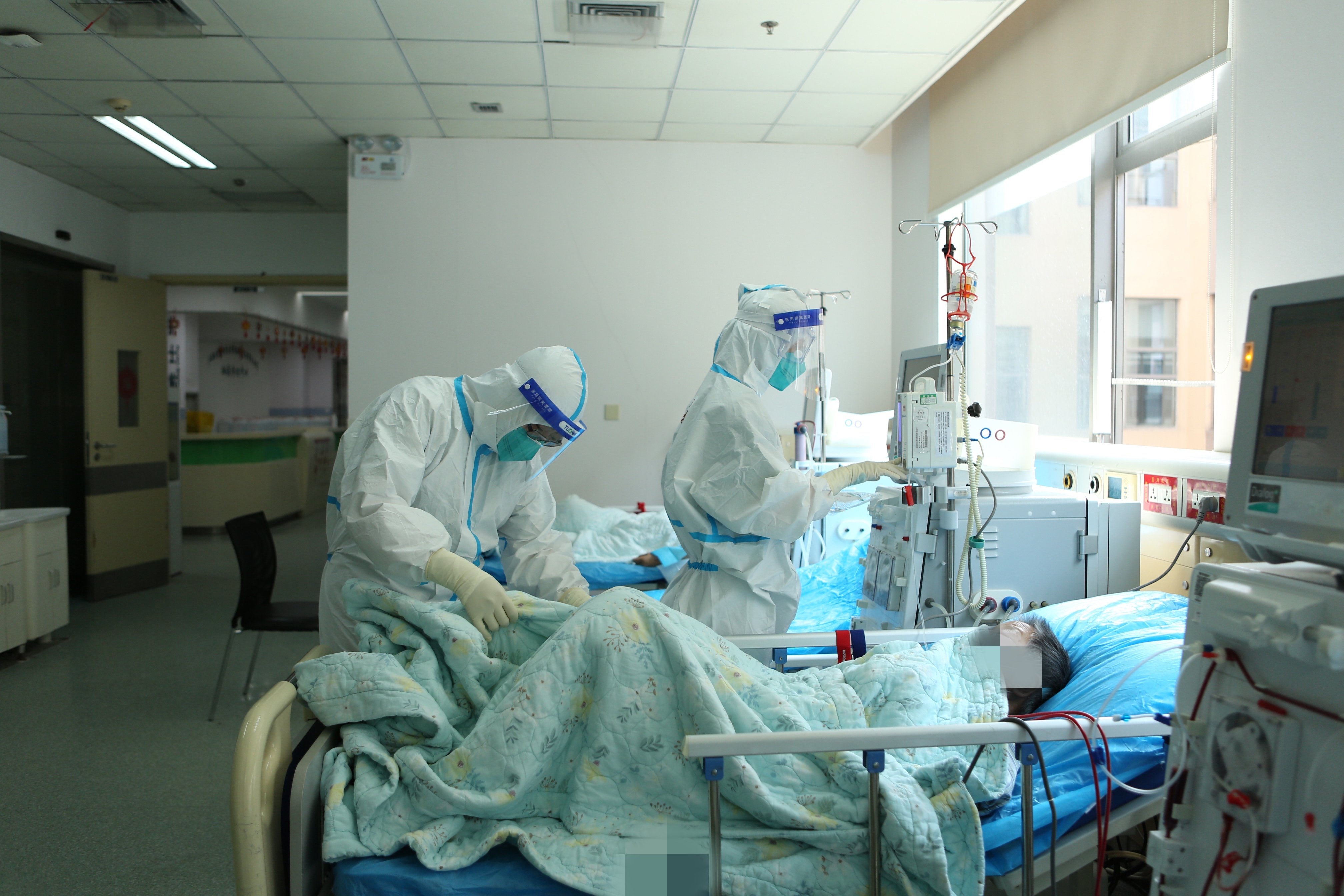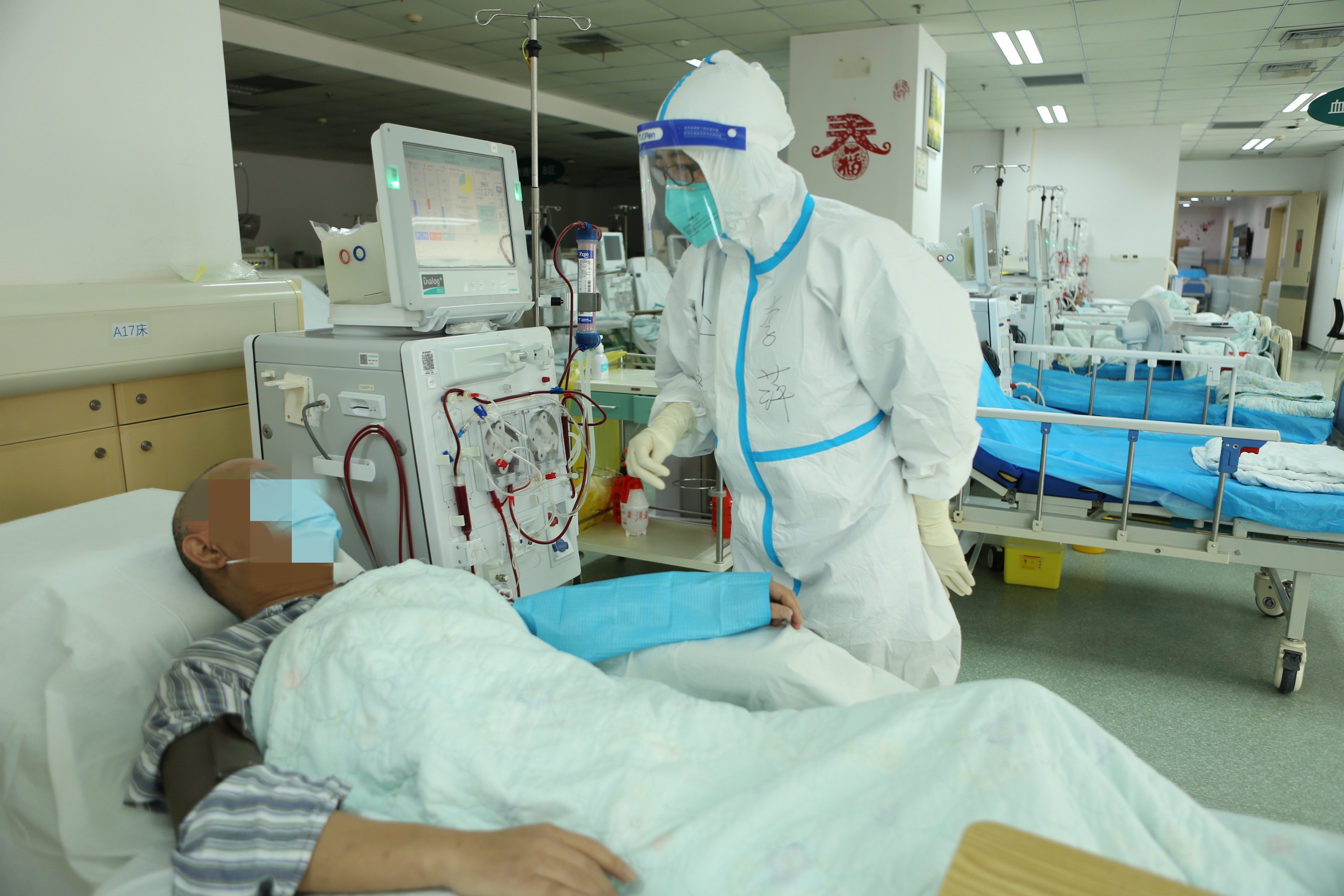The medical staff wore heavy protective clothing and three layers of protective gloves to install the dialysate on each instrument… At 8 am on the 27th, the Renji Hospital Affiliated to Shanghai Jiaotong University School of Medicine South Campus (designated hospital ) The hemodialysis room is busy. During the epidemic prevention and control period, this is the normal work of many hospital hemodialysis rooms.
According to Gu Leyi, director of Renji Hospital’s Nephrology Department, hemodialysis patients are often weaker and have relatively low immunity. In addition, hemodialysis patients are mainly the elderly, who often gather in one space for treatment. Treatment, the possibility of contracting the new coronavirus, and the risk of subsequent severe disease are higher, and the rescue task is more critical.
“The treatment of positive hemodialysis patients is more complicated, because in addition to the changes in lung infection caused by the new coronavirus, we also need to pay attention to some problems caused by their own underlying diseases.” Gu Leyi said that many Hemodialysis patients themselves have serious cardiovascular diseases. Among the hemodialysis patients he came into contact with, most of the deaths were caused by cardiovascular diseases, not uremia.

The medical staff is giving the patient hemodialysis (photo provided by the interviewed unit)< /p>
On April 3rd, Renji Hospital’s South Campus received a notice that it was changed to a designated hospital. After the completion of the hospital’s space reconstruction, patients will be officially admitted. A set of daily lines linking the East and South Campuses The above discussion system has also been gradually established. Doctors in designated hospitals and experts from parent hospitals discuss the diagnosis and treatment plans for critically ill patients in the hospital one by one, and formulate “one person, one policy” precisely.
“The discussion that integrates the advantages of various departments has brought ‘gospel’ to all hemodialysis patients, and the therapeutic effect has also been improved to a certain extent. As long as the hemodialysis patients show signs of becoming serious, they will He was transferred to the ICU (intensive intensive care unit) ward.” Gu Leyi said.
He said, for example, that there was a severe case affected by the epidemic prevention and control. Hemodialysis was not performed for nearly a week. symptom. “From the CT image of this case, the lungs are still mainly congested, not the exudation of the virus. After consultation, experts believe that the main cause of the patient is heart failure. After continuous dialysis for the patient, he lost 3 kg” After the emergency treatment, the situation improved.”
While the treatment was being carried out, the medical staff of Renji Hospital also strengthened the epidemiological investigation during the closed-loop operation to prevent large-scale cross-infection in the hospital.
Gu Leyi said: “Even if the patient is not positive for the new coronavirus, the medical staff must follow the protection requirements of the fever clinic, and perform hemodialysis for the patient after doing secondary protection, which brings great benefits to our work. ”
“We spend an hour to an hour and a half every morning to check the health code of each patient and understand the management and control of their place of residence. If we find any doubts, we will repeatedly contact the neighborhood committee. Verify and find out the specific situation. Through such strict measures, try to exclude the risk from the hemodialysis room to prevent secondary transmission.” Gu Leyi said.
Before 8:00 every morning, Li Ping, head nurse of the hemodialysis room in the south campus of Renji Hospital, and her colleagues had already prepared personal protection before entering the hemodialysis room, and installed the tubes required for dialysis treatment. Once the machine is ready, start treating the patient. “The patient’s single treatment time is about 3.5 hours, 3 times a week. The working time of the staff in the hemodialysis room is basically 5 to 6 hours, and the preliminary preparation process takes about 45 minutes, and sometimes may Longer.”

Li Ping explained to the patient the dialysis treatment process during home isolation after discharge (interviewed Photo provided by the unit)
It is reported that at present, Shanghai adheres to the three principles of preventing mild to severe and severe treatment, paying equal attention to new crown treatment and basic disease treatment, and paying equal attention to traditional Chinese and Western medicine. More than 360 critical care medical experts with rich experience, plus experts supported by other provinces and cities, have formed 9 critical care teams and stationed in 8 city-level designated hospitals to treat patients with severe new crown, critical disease and new crown positive combined with underlying diseases. , the implementation of centralized management and comprehensive treatment.
“In order to make the best use of resources, we always adhere to the principles of adequate ward setting, adequate staffing, and adequate patient admission in the construction of the intensive care unit.” Renji Hospital Affiliated to Shanghai Jiaotong University School of Medicine Vice President Wang Zheng said that the ICU is the “main battlefield” for the treatment of critically ill patients with the new crown. At present, Renji Hospital has nearly 40 critically ill beds, and the oldest among the elderly rescued is 97 years old.
“The diagnosis and treatment of basic diseases is still in accordance with the specialized setting. We try our best to restore the discipline system of the designated hospital, so that the right doctor can see the right patient, so as to give full play to the maximum potential of limited strength.” Wang argue. (Reporters Yang Kai and Yuan Quan)